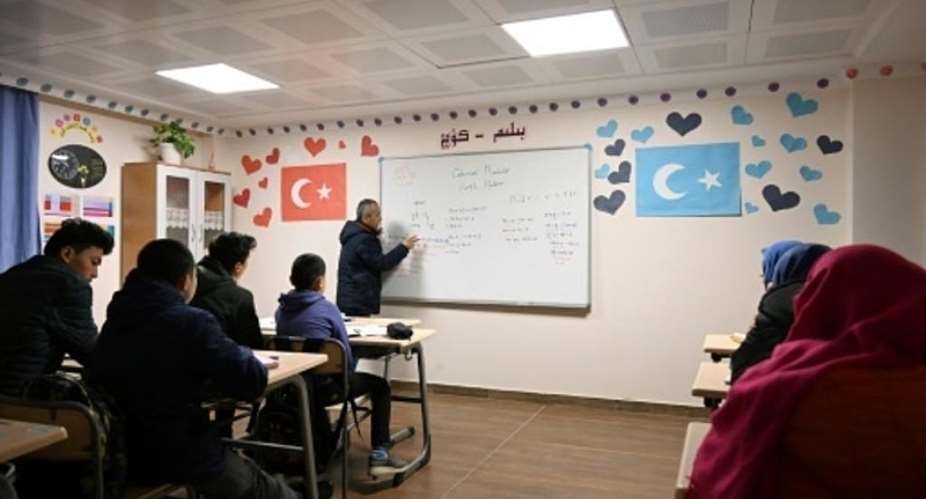The fate of tens of thousands of Uighur refugees in Turkey is threatening to become an embarrassing political controversy for Turkish President Recep Tayyip Erdogan.
With the Turkish Parliament poised to ratify a Chinese extradition agreement, Erdogan, who positions himself as a defender of global Muslim rights, is being accused of selling out Uighur refugees.
"The government tell you that Turkey is the greatest supporter of Muslims in the world. But they fail to hear the cries of our brothers and sisters in China who are tortured for saying they're Muslims," bellowed earlier this month, Meral Aksener in an address to her parliamentary deputies of the center-right Good Party.
"From Europe and America, we hear sounds of condemnation, but from Ankara only silence," Aksener added.
A TV simulcast of Aksener's speech was cut when she invited a Uighur refugee to speak. The state broadcaster did not explain the incident, but it went viral across social media, under the hashtag, "AKP silences Uighurs".
While Erdogan regularly lambasts Turkey's western allies over its treatment of its Muslim minorities, decrying what he calls the rising scourge of islamophobia, the Turkish president remains silent on China's crackdown against its predominantly Muslim Uighur.
Despite Ankara's silence, Turkey is a refuge to one of the world's largest Uighur refugee populations, with over 50,000 estimated to have found sanctuary there.
But rights groups are now voicing alarm that the Uighur haven could be under threat as the Turkish Parliament considers an extradition law with China.
Serious problems with the new law
"We will be accepting a legal document that would put Turkey into the position of being under obligation to extradite people to China without confirming if they committed a crime or not," explains lawyer Ibrahim Ergin of the Istanbul-based International Refugee Rights Association.
Ergin has many Uighur clients fighting Chinese extradition.
"In the case of my client Abdulkadir Yapcan five witnesses that claimed my client is a terrorist in the evidence offered by China were executed," explains Ergin. "They have executed even the witnesses who accused my client; what kind of justice will he face back in China."
The extradition agreement comes amidst deepening economic and financial ties between Ankara and Beijing. China is also Turkey's leading supplier of Covid-19 vaccines. A recent delay in delivering the vaccines was interpreted by some here as a prod by Beijing for Ankara to expedite ratifying the extradition agreement.
Mass immolation threathened in Ankara
Alarmed at the looming extradition threat, Uighur leader Seyit Tumturk, Head of the East Turkistan National Assembly, warned on Twitter tens of thousands of Uighurs would burn themselves in front of the Turkish presidential palace if the extradition law is passed.
Tumturk's address went viral in Turkey. "There have been very positive reactions that made us happy," said Tumturk. "Our Turkish brothers went to the homes of their Uighur neighbours and said, this law will not pass in Turkey; we are here for you."
The opposition is vowing to oppose the extradition law in parliament. "Any deputy who votes in favour of it will have blood on their hands," warned Aksener. Under growing pressure, the government still has not announced a date when parliament will vote on the extradition agreement.
Promise that there'll be no deportations
But the Turkish foreign minister Mevlut Cavusoglu, perhaps mindful of the strong backing for Uighurs among many government supporters, has promised no Uighurs will be deported to China.
But for a small group of Uighurs who protest outside China's Istanbul Consulate, holding photos of relatives they claim are being held in Chinese detention camps, there is growing unease and a sense of helplessness.
"In the past, the Turkish government showed its support to Uighurs on many platforms, says Azimet Mohammed, "but because of the increase in economic and technological relations with China, I don't believe that Turkey is offering open support to Uighurs anymore. But there is nothing we can do about it."





 We’ll no longer tolerate your empty, unwarranted attacks – TUC blasts Prof Adei
We’ll no longer tolerate your empty, unwarranted attacks – TUC blasts Prof Adei
 Bawumia donates GHc200,000 to support Madina fire victims
Bawumia donates GHc200,000 to support Madina fire victims
 IMF to disburse US$360million third tranche to Ghana without creditors MoU
IMF to disburse US$360million third tranche to Ghana without creditors MoU
 Truck owner share insights into train collision incident
Truck owner share insights into train collision incident
 Paramount chief of Bassare Traditional Area passes on
Paramount chief of Bassare Traditional Area passes on
 Two teachers in court over alleged illegal possession of BECE papers
Two teachers in court over alleged illegal possession of BECE papers
 Sunyani: Victim allegedly shot by traditional warriors appeals for justice
Sunyani: Victim allegedly shot by traditional warriors appeals for justice
 Mahama vows to scrap teacher licensure exams, review Free SHS policy
Mahama vows to scrap teacher licensure exams, review Free SHS policy
 Government will replace burnt Madina shops with a new three-story, 120-store fac...
Government will replace burnt Madina shops with a new three-story, 120-store fac...
